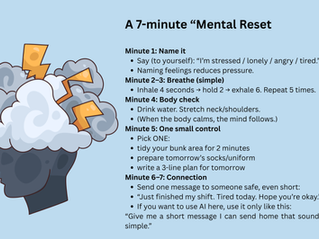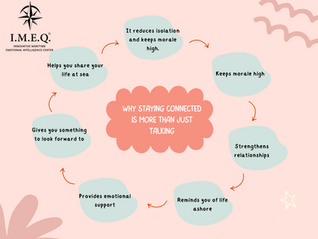Mental Health onboard: a quick test
- Aug 22, 2023
- 3 min read
Updated: Sep 12, 2023

Mental health refers to your emotional, psychological, and social well-being. It encompasses your ability to manage stress, relate to others, make decisions, and handle challenges. Good mental health contributes to overall well-being and enables you to cope with life's ups and downs, work productively, and maintain healthy relationships.
Quick Self-Check for Mental Health (Seafarers):
Please note that this quick self-check is not a substitute for professional evaluation. If you have concerns about your mental health, it's important to seek guidance from a mental health professional.
Answer the following questions honestly:
1. Emotional Well-being:
Are you feeling consistently sad, hopeless, or overwhelmed?
Have you lost interest or pleasure in activities you used to enjoy?
2. Energy and Motivation:
Do you often feel tired, fatigued, or lacking energy?
Are you finding it hard to get motivated even for things you need to do?
3. Sleep Patterns:
Are you experiencing changes in your sleep patterns, such as insomnia or oversleeping?
4. Appetite and Eating Habits:
Have your eating habits changed significantly? Are you overeating or losing your appetite?
5. Concentration and Focus:
Are you having difficulty concentrating, making decisions, or thinking clearly?
6. Physical Symptoms:
Have you noticed unexplained physical symptoms, such as headaches or body aches?
7. Social Interaction:
Are you withdrawing from social activities or avoiding interactions with friends and family?
8. Negative Thoughts:
Are you having persistent negative thoughts about yourself, life, or your future?
9. Irritability and Anger:
Are you becoming easily irritable, frustrated, or experiencing uncharacteristic anger?
10. Thoughts of Self-Harm or Suicide:
Are you having thoughts of hurting yourself or thoughts of suicide?
Scoring:
If you answered "Yes" to several of these questions and are experiencing significant distress, it's important to seek professional help.
If you're concerned about your mental health, consider reaching out to a mental health professional, counselor, or a medical doctor.
Remember that mental health is important and seeking help when needed is a sign of strength. It's okay to reach out for support, whether it's through your company's resources, a mental health hotline, or a local mental health provider.
Dealing with poor mental health while onboard as a seafarer can be challenging, but there are strategies you can implement to take care of yourself and seek support. Here are some steps to consider:
1. Recognize and Acknowledge Your Feelings:
Understand that it's okay to have bad days and experience negative emotions. Recognize and acknowledge your feelings without judgment.
2. Reach Out for Support:
If you're struggling, don't hesitate to talk to a trusted colleague, friend, or family member onboard. Sometimes, sharing your feelings can provide relief and help you feel less isolated.
3. Utilize Onboard Resources:
Some vessels offer mental health resources, counseling services, or designated personnel who can provide support. Be aware of these resources and take advantage of them if available.
4. Practice Self-Care:
Engage in activities that bring you joy and relaxation. This could include reading, listening to music, journaling, or spending time in nature.
5. Maintain a Routine:
Establishing a daily routine can provide a sense of structure and stability, which can be beneficial for your mental well-being.
6. Stay Physically Active:
Regular exercise can have a positive impact on your mood. Even simple activities like stretching or taking short walks on deck can help.
7. Prioritize Sleep:
Aim for sufficient sleep to help regulate your mood and manage stress. Create a comfortable sleeping environment and practice good sleep hygiene.
8. Practice Mindfulness and Relaxation Techniques:
Techniques like deep breathing, meditation, and mindfulness can help you manage stress and stay present in the moment.
9. Limit Stressors:
Identify and manage sources of stress to the best of your ability. This could include setting boundaries, delegating tasks, or seeking assistance when needed.
10. Stay Connected:
Stay in touch with loved ones through emails, calls, or messaging apps. Feeling connected to your support network can be comforting.
11. Set Realistic Expectations:
Don't put undue pressure on yourself to be constantly productive or upbeat. Understand that your well-being matters, and it's okay to prioritize self-care.
12. Seek Professional Help:
If your mental health deteriorates significantly or you're experiencing thoughts of self-harm or suicide, it's crucial to seek professional help immediately. Speak to a mental health professional, counselor, or medical doctor.
Remember that you're not alone in facing challenges with mental health. Many seafarers experience similar feelings and struggles. Seeking help is a sign of strength, and taking care of your mental well-being is just as important as your physical health. If your company offers mental health services or access to counselors, consider utilizing these resources as well.





































































































Comments